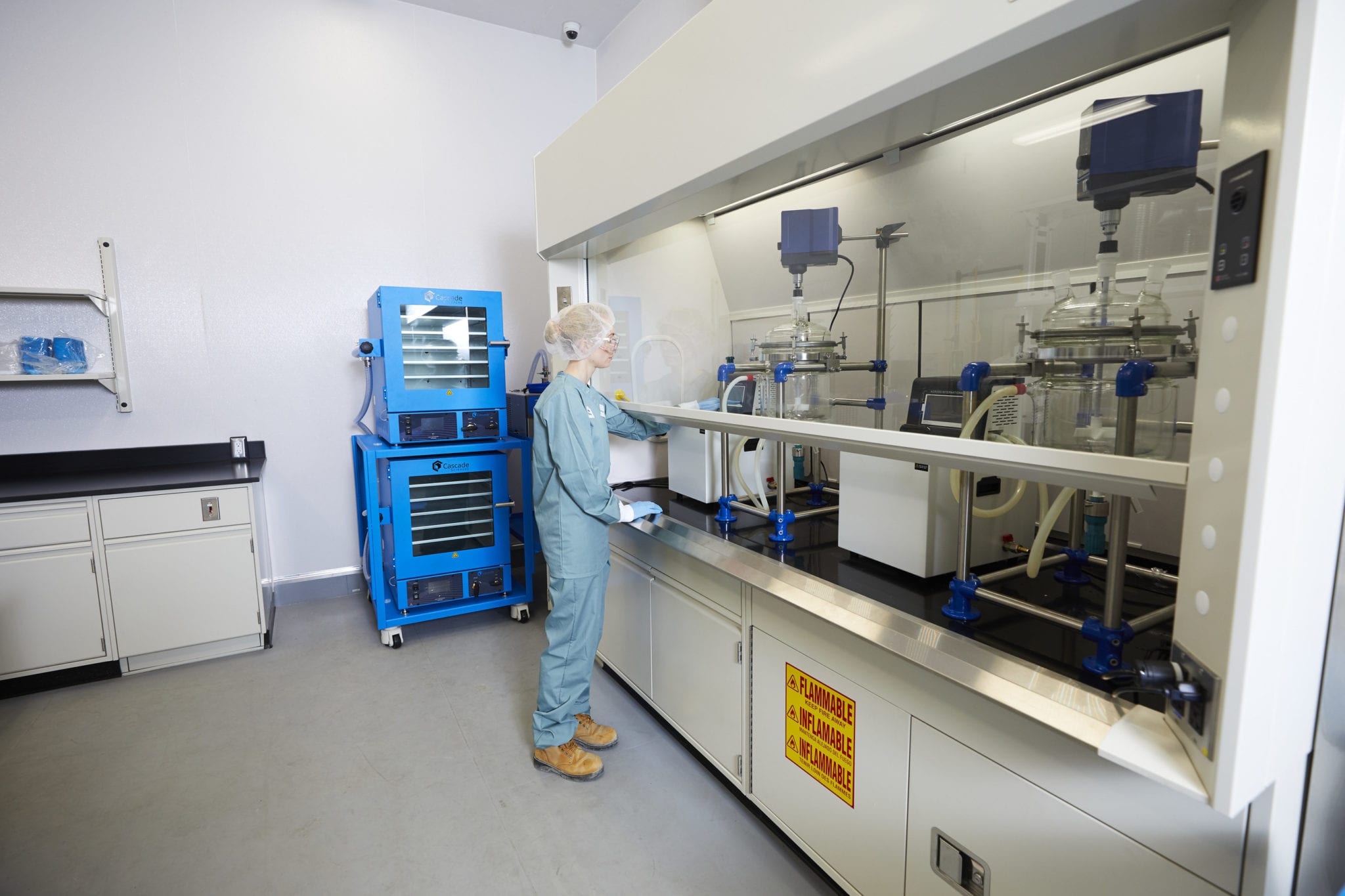Westleaf Inc. (TSX-V:WL)(OTCQB:WSLFF) said its large scale cannabis extraction facility got the green light from Health Canada to start operations immediately and the “timing is perfect” as the news comes just ahead of second-phase products such as infused edibles, beverages and topicals becoming legal nationwide.
The Calgary-based company announced Tuesday The Plant by Westleaf Labs gained a standard processing licence from the federal regulator which will allow it to process bulk cannabis and create and sell derivative products through the company’s own unique music brands, as well as through white label deals and bulk tolling contracts.
“The licensing of The Plant is one of the most significant milestones Westleaf has achieved to date,” said CEO Scott Hurd in a phone interview with Mugglehead. “The timing of the licence is perfect as it will allow us to operationalize and have derivative products in the market in time for the launch of cannabis 2.0.”
The company’s 15,000 square foot facility is designed to process up to 65,000 kilograms of dried cannabis per year and it was built to meet European Union good manufacturing practice (GMP) certification — the highest standard in quality. The Plant has an additional 45,000 square feet for expansion of both extraction capacity and additional product lines to meet consumer preferences, Westleaf said.

Supercritical cannabis CO2 extractor at The Plant by Westleaf Labs, Calgary, Alberta, October, 2019. Photo by Todd Korol. (CNW Group/Westleaf Inc.)
Cannabis 2.0 brings industry optimism
The next wave of legalization begins Oct. 17 in Canada, but licensed producers will have to verify their products are safe through federal regulators and the wide range of new cannabis products are expected to be on store shelves by mid-December.
Hurd expects the Canadian market for derivative products will look similar to U.S. markets like Colorado where edibles, concentrates and vape products are on pace this year to make up more than 50 per cent of the US$1.6 billion legal pot sales, according to BDS Analytics.
“By owning one of the largest extraction, processing and product formulation facilities in Canada, we’re uniquely positioned to be a significant competitor in the formulation and sale of cannabis derivative products,” Hurd said.
The value-added products are expected to attract an estimated three million new consumers across the country, and the new market could be worth $2.7 billion, according to Deloitte.
Hurd said the company is gearing up to launch its vape pen products under its General Admission brand by late December or early January. CBD topical products will be launched early next quarter under its Loon wellness brand, and ultra premium cannabis concentrates will be released under its Backstage banner. Hurd said the company is also excited to launch a line of edible products next year.
Westleaf anticipates strong demand for high quality extraction services and Hurd said it is pursuing some contract manufacturing opportunities.
“We’ll actually source feedstock, formulate the product and handle the distribution and sale on their behalf across Canada,” he said.
The company inked a deal with pot producer Delta 9 (TSXV:NINE) this summer to supply about $4 million in white-label cannabis products as part of a one-year agreement, with the option to increase the amount up to $16 million a year.
Hurd added it is also tolling agreements with licensed producers to process product on their behalf and ship them back bulk distillate or processed oil.
.@Westleaf_Inc Westleaf's The Plant receives Health Canada Standard Processing licence and is ready to go for the advent of the second round of legalized recreational cannabis in Canada. #Cannabis2.0 https://t.co/YUdrAAM0Kj pic.twitter.com/EqwPboFmpK
— Decibel Cannabis Company (@Decibel_CC) October 15, 2019
Westleaf’s focus on quality, safety
With the vaping-related illness cases reaching 1,300 across the U.S. as of last week, Hurd said the Canadian cannabis sector will be zeroed in on safety as the popular cannabis vape products hit the market north of the border.
“The whole industry including Westleaf is very focused on ensuring that any products we put into the market for consumption are safe,” Hurd said. “Health Canada is very focused on developing a regulatory framework to ensure that every ingredient that goes into a vape pen or any other products for that matter is suited for consumption.”
There is a growing consensus dangerous pesticides and additives found in black market marijuana vape cartridges could be the main cause of the outbreak.
Westleaf built an in house testing lab at its extraction facility and the company will test its products before they go out for external testing mandated by Health Canada, Hurd said.
“So there’s a number of touch points from a supply chain, from a process perspective, and from a testing perspective, that we have internally to ensure all products coming out of that facility or safe and ready for consumption,” he said.
To ensure derivative cannabis products are the highest quality, Westleaf partnered with Colorado-based Xabis Inc., an extraction company with decades of experience in eight U.S. markets.
“Our partnership with Xabis has been very strategic for Westleaf,” Hurd said. “We’ve been able to leverage their operating experience in legalized markets in the U.S. and apply that to what we’re doing at the Plant here in Calgary.”
In addition to designing Westleaf’s facility, Hurd said Xabis provides the company with more than 200 individual product formulations (SKUs) that it utilize rather than having to do a lot of research and development of its own to get high quality products to market quicker.

Westleaf’s Thunderchild large-scale cultivation facility in Battleford, Saskatchewan. (Source: Westleaf)
Thunderchild cultivation allows Westleaf to do “craft at scale”
The company’s 80,000 square foot Thunderchild grow facility in Battleford, Sask. is on track for completion at the end of the year when Westleaf can submit its application for a Health Canada cultivation licence.
“What’s interesting about that project is … and what we’ve been getting from the industry, it’s one of the largest facilities in the industry that was built to do craft at scale is what we call it,” Hurd said.
The CEO explained the large facility will feature small batch grow rooms using high quality genetics, while also using traditional drying methods and hand trimming the cannabis.
It’s incredibly impressive what we’ve built out there. We expect to be ready to submit our licence (application) to Health Canada by the end of the year. The ideas is craft growing that will reach economies of scale, and Hurd said, that will translate into a high quality derivative products such as concentrates or a strain-specific vape pen.
“Those are the opportunities where you can really stretch margin in that ultra premium segment that we are targeting,” he said.
Prairie Records retail chain gives company golden opportunity
Westleaf’s Prairie Records was named the top retailer in Canada last month at the Grow UP conference and expo, and the company operates three stores in the Saskatoon area and on in Calgary, with up to 20 more locations in development throughout Western Canada.
Inside the stores, information for cannabis products is displayed on square-shaped cards that mimic music records. Details of each strain is printed on the record discs encouraging customers to explore and learn about the cannabis products, providing a distinct in-store experience.
Hurd said owning retail allows the company to get real time data analytics and really understand consumer preferences.
“We can understand exactly what the consumers looking for it and we can take that and create a feedback loop so that we can contour our product offerings in real time to meet the changing demands of consumers,” he said.
Not only will the customer feedback loop help Westleaf create some top-notch cannabis 2.0 products, but it has allowed the company to learn there is a gap in the market in the ultra premium segment, which it plans to exploit once Thunderchild comes online.
“That’s what gets us really excited because we’ve built very high quality assets. We’ve invested in building quality assets and a quality team,” Hurd said.

Westleaf’s Prairie Records store concept. (Source: Westleaf)
Disclosure: Directors of Mugglehead own shares of Westleaf and Westleaf is an advertiser on this website.














